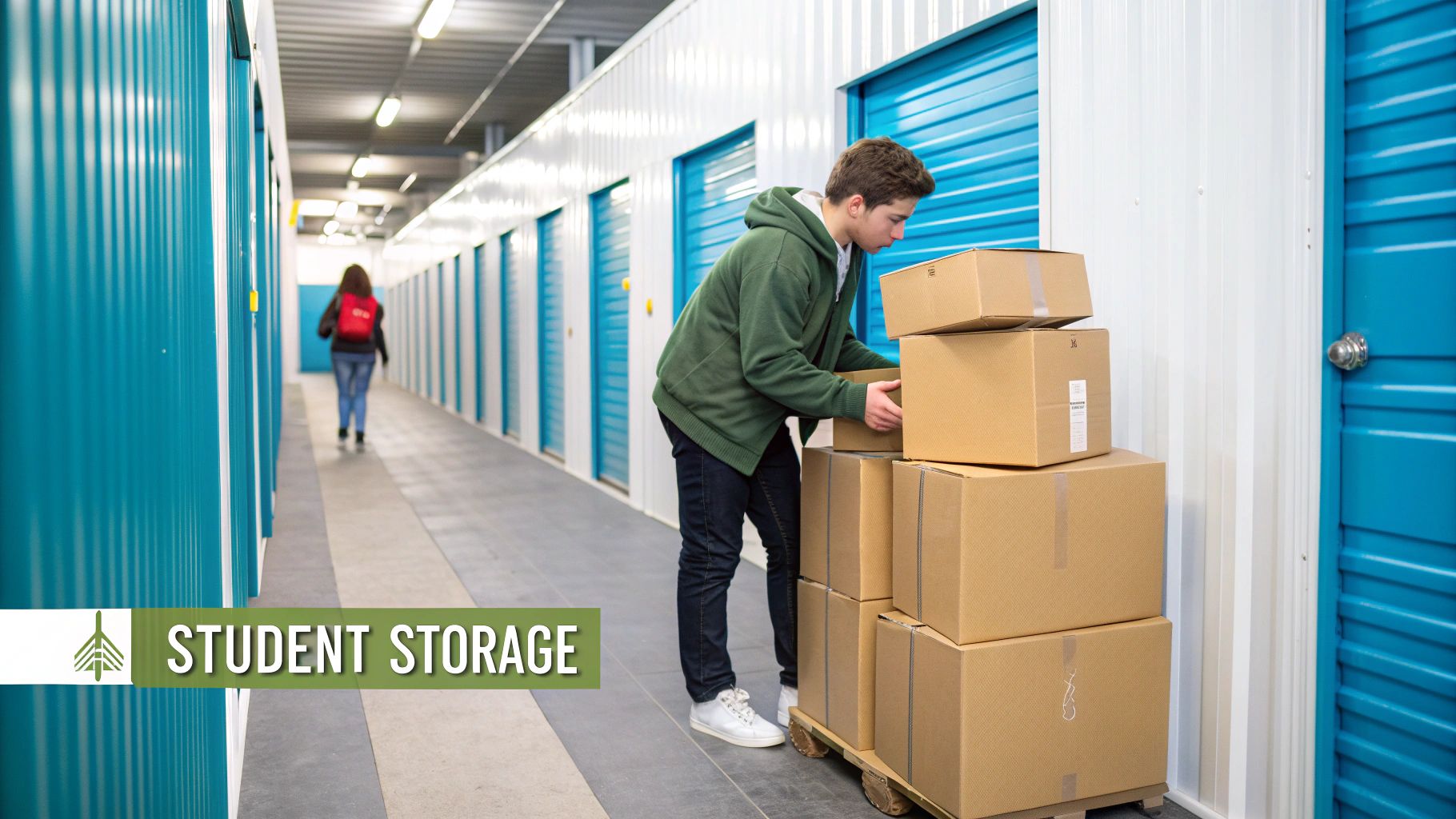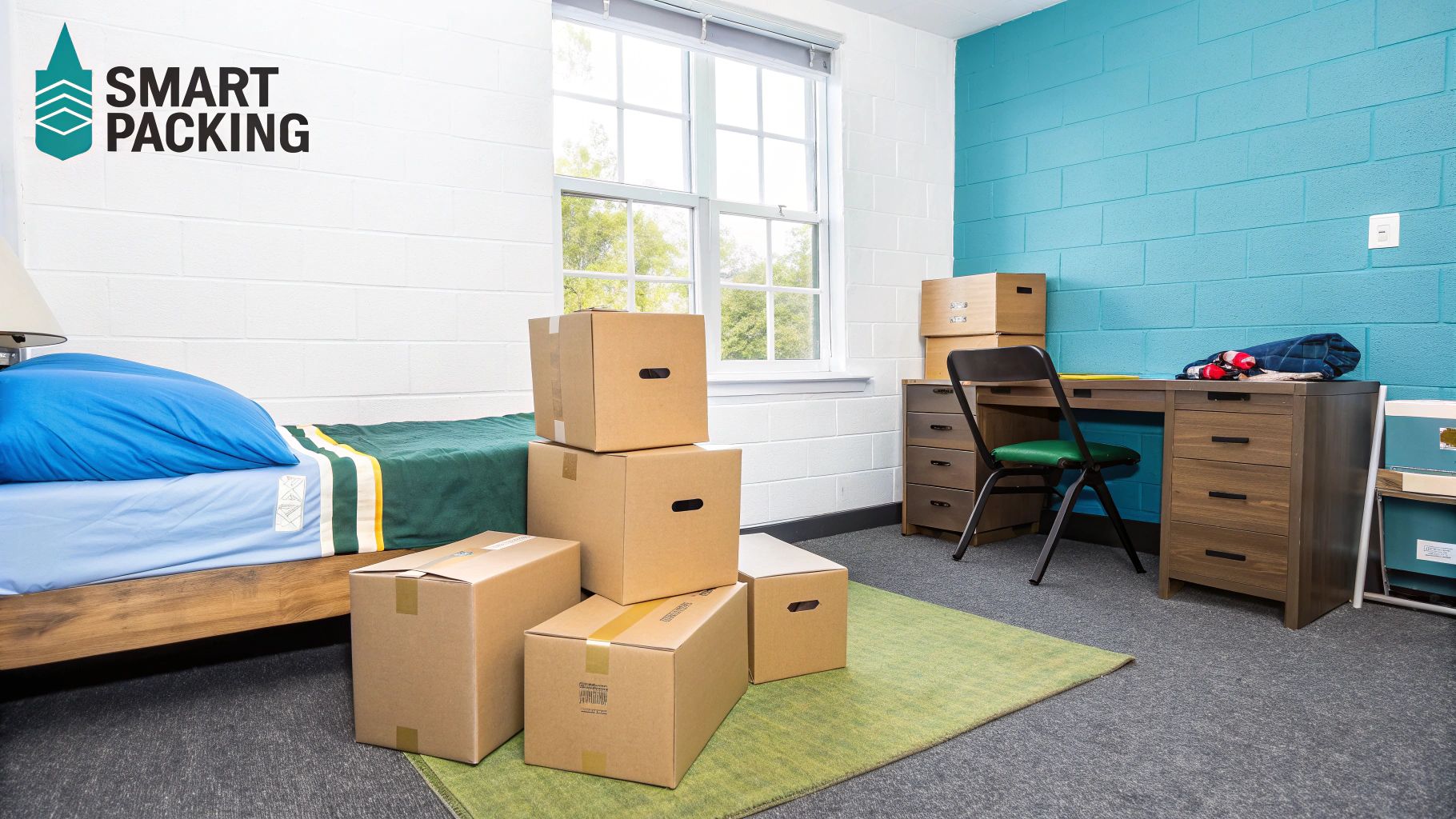Let’s face it, moving between your university digs and home can be a massive headache, especially when you’re staring down a long summer break or jetting off for a year abroad. This is where storage units for students come in, turning a logistical nightmare into a simple, sorted task. Think of it as a secure, convenient home-away-from-home for your belongings, giving you the peace of mind to focus on your studies and actually enjoy your uni experience.
Why Smart Students Use Self Storage

University life is a constant cycle of moving in and out. As soon as one academic year ends, the same old problem pops up: what on earth do you do with all your stuff? Lugging everything back home, only to haul it all back a few months later, isn't just a pain—it’s expensive and exhausting.
This is where self storage becomes a student's best friend. Picture it as your personal, off-campus cupboard. Instead of cramming everything into your parents' garage or turning your childhood bedroom into a cluttered mess, you can keep it all safe, sound, and organised near your university. It's a simple move that makes the transition between terms so much less stressful.
The Clear Advantages for University Students
For students, the benefits go way beyond just convenience. Self storage offers a genuinely practical fix for several common uni-life challenges.
- A Secure Hub Between Accommodations: Often, there’s an awkward gap when you’re moving between halls and private housing. A storage unit is the perfect secure holding space for your possessions during that limbo period.
- Freedom During Summer and Holidays: Enjoy your summer break without the drama of transporting bulky items like mini-fridges, bedding, or a mountain of textbooks back and forth across the country.
- Support for a Year Abroad: If you're heading off to study abroad for a term or a full year, a storage unit keeps your belongings safe until you get back, completely removing any long-distance moving worries.
Self storage gives you a strategic advantage, freeing you up to concentrate on your education without the logistical burden of managing all your possessions. It’s an investment in a smoother, more organised university life.
This growing need is being noticed. The UK self storage industry has seen a 7.2% increase in total floorspace, driven in part by the rising demand from students who need flexible and secure options. You can discover more about the UK self storage industry's growth on januseurope.com. By getting to know the benefits of https://shieldselfstorage.co.uk/self-storage/, you can make a smart choice for a stress-free academic journey.
Choosing the Right Size Storage Unit
Picking the right size for your student storage unit is a bit like a real-life game of Goldilocks – you need one that’s just right. Go too big, and you're just paying for air you don't need. Go too small, and you'll be wrestling with your belongings on moving day, trying to solve an impossible Tetris puzzle. The sweet spot is finding a unit that fits everything comfortably without wasting your student budget.
Think of it like packing for a trip. You wouldn’t drag a giant suitcase along for a weekend away, but you also wouldn't try to cram two weeks' worth of gear into a tiny rucksack. It’s all about taking a realistic look at what you need to store to make a smart, cost-effective choice.
Visualising Common Student Storage Sizes
To take the guesswork out of it, let’s get a picture of what actually fits into the most common unit sizes for students. These options usually offer more than enough room for the typical stuff you gather over a term, from textbooks and bedding to that trusty mini-fridge.
- 25 sq ft Unit: This is the go-to choice for most students. Picture a large walk-in wardrobe. It's ideal for storing around 30-40 medium boxes, a desk chair, a small TV, and personal bits like clothes and books.
- 35 sq ft Unit: A little step up, this is about the size of a large garden shed. It can easily hold everything from the 25 sq ft unit plus a small mattress, a bike, and a few extra pieces of furniture like a bedside table or a bookshelf.
- 50 sq ft Unit: If you're sharing with a mate or you’ve got more furniture, this is a brilliant option. Think of it as half a standard single garage. It has enough room for the contents of a small studio flat, including a double mattress, a small sofa, and plenty of boxes.
To give you a better idea of what to expect, the table below breaks down the common sizes and what they can hold.
Student Storage Unit Size Guide
| Unit Size (sq ft) | Typical Contents | Best For |
|---|---|---|
| 25 sq ft | 30-40 boxes, desk chair, small TV, clothes, books. | The solo student storing the contents of a typical dorm room for the summer. |
| 35 sq ft | Everything in a 25 sq ft unit, plus a bike, small mattress, and a few small furniture items. | Students with a few extra bulky items like a bicycle or small furniture. |
| 50 sq ft | Contents of a small studio flat: double mattress, small sofa, kitchen items, and numerous boxes. | Students sharing a unit or those with more furniture from a flat-share. |
This guide should help you narrow down your choice, but remember to think about how you'll pack to make the most of the space.
The type of storage you choose matters too. The infographic below highlights the main categories you'll come across.

As you can see, your main options boil down to climate-controlled, drive-up, and standard indoor units, each with its own perks. If you’re storing valuable electronics or delicate items, splashing out for climate control offers an extra layer of protection worth considering.
The key is to create an inventory list before you start looking. Tally up your boxes, furniture, and odd-shaped items to get a clear picture of your actual space requirements. This simple step can save you both money and hassle.
Choosing the right size is a huge part of the puzzle, but it’s not the only piece. For a bigger picture, have a look at our guide on how to choose the best storage facility when moving house to learn about other important things to keep in mind. Taking a bit of time to properly figure out your needs will ensure you find the perfect storage solution.
A Realistic Guide to Student Storage Costs

Let's be honest, budgeting is a massive part of university life. Knowing what you'll actually pay for storage units for students is a must. The price you're quoted isn't just a random number; it's shaped by a few key things that can either save you a bit of cash or leave you with an unexpected bill. A little inside knowledge on what to look for goes a long way.
The first big one is location. A storage facility smack bang in a city centre or right next to campus is going to cost more than one that's a short bus ride away. It’s just like student housing—you pay a premium for those prime spots.
Then there's how long you need it for. Short-term contracts are brilliant for the summer break, but many places offer better deals if you commit to a longer stretch. If you're planning a year abroad, locking in a longer-term rate could cut your costs down quite a bit.
What Really Influences the Price Tag
Beyond the obvious factors of where it is and for how long, a few other details will affect your final bill. Keep these in mind, and you'll be well on your way to finding the best value without any nasty surprises.
- Unit Size: We’ve touched on this, but it’s the easiest way to waste money. Paying for space you don't need is a classic mistake. If you're not sure how much room you'll need, it's always worth checking a storage calculator to get a better feel for it.
- Special Offers: Keep an eye out for introductory deals. Many companies run promotions like the first month for £1 or offer student-specific discounts, especially as term ends. It never hurts to ask what's available.
- Insurance and Deposits: This is where hidden fees often pop up. Most facilities will require you to have insurance for your things, which is an extra monthly cost. Some might also ask for a refundable security deposit upfront, so be prepared for that.
On average, self storage in the UK costs around £2.43 per square foot per month before VAT, and most students go for units between 25 to 50 sq ft. This means you could be looking at anything from £25 to £100 a month, depending heavily on the factors we've just covered. With over 54% of UK self storage users being younger people, these details are more relevant than ever.
Smart Ways to Save on Student Storage
Finding a deal on a storage unit doesn't have to be a mission. One of the best tricks is to team up and share a larger unit with friends. Splitting a 50 sq ft unit between two of you is almost always cheaper than renting two separate 25 sq ft units.
Sharing a storage unit is a fantastic way to cut costs, but clear communication is crucial. Make sure everyone's name is on the rental agreement and you have a plan for accessing your belongings to avoid any future disagreements.
Finally, a simple but effective tip: book in advance. Prices tend to creep up as demand skyrockets towards the end of term. Nabbing your unit four to six weeks early not only guarantees you'll get a spot but often locks in a much better price.
Must-Have Security and Access Features
When you're trusting a storage unit with everything from your expensive laptop and textbooks to irreplaceable personal items, security isn't just a nice-to-have feature. It's everything. That peace of mind, knowing your stuff is safe, is completely non-negotiable. Good facilities that offer storage units for students get this and invest heavily in proper security.
Before you sign anything, you should be doing your own mini security audit. Look for clear, modern surveillance and access control. We're not talking about a single, grainy camera pointed at the entrance. You want to see a layered system designed to protect every inch of the property, right down to your own unit.
Key Security Features to Look For
To make sure your possessions are genuinely protected, there are several key features a high-quality storage facility should have nailed down. Think of this as your security checklist when you're comparing your options.
- 24/7 CCTV Surveillance: The place should be covered by high-definition cameras monitoring all the key spots—entrances, exits, corridors, and loading bays—around the clock. This is a huge deterrent and provides a clear record if anything ever happens.
- Secure Gated Access: Entry should be tightly controlled through a secure electronic gate that needs a unique PIN code or key fob. This is basic stuff, but it means only authorised customers and staff can get onto the premises.
- Individual Unit Alarms: This is a big one. For an extra layer of protection, some of the better facilities offer alarms on each individual unit. If someone tampers with your specific unit, an alarm is triggered.
- On-Site Staff: Having actual people on-site during business hours adds a massive human element to security. They can keep an eye on things, help customers, and react quickly if any issues pop up.
Understanding Access Hours
Beyond security, you need to think about when you can actually get to your things. Access hours can vary wildly between different places. Some stick to standard business hours, while others offer extended access or even 24/7 availability.
Think about your university schedule. If you’re pulling all-nighters studying or have lectures at the crack of dawn, a facility with more flexible hours might be a lifesaver. Just be aware that facilities with round-the-clock access may have different security protocols during unmanned hours, so it's vital to ask how they keep things safe overnight.
Your belongings represent a significant investment of both money and memory. Choosing a facility with comprehensive security isn't an overreaction; it's a smart, necessary step to protect what's yours.
At the end of the day, the right choice is one that balances robust security with practical access that fits your life. Don't be shy about asking direct questions about their cameras, alarm systems, and staff presence. Once you have a clear picture of a facility’s security and access features, you can confidently get a quote for a student storage unit knowing your possessions will be safe and sound.
Your Step-by-Step Moving and Packing Plan

Moving your stuff into storage doesn't have to be a last-minute panic. With a bit of planning, the whole process can be surprisingly smooth. This guide will walk you through everything, from booking your unit to packing that final box like a pro.
First things first: book your unit. The student storage market is buzzing right now, especially with easy online booking services popping up everywhere. This means demand skyrockets around term breaks and summer holidays, so getting in early is a smart move. If you're curious about the trends, you can read the full research on the student storage market on archivemarketresearch.com.
Securing Your Unit and Getting Ready
Once you’ve found the perfect facility, you'll need a few documents to get the rental agreement sorted. It’s a simple process, but having everything ready makes it even faster.
- Proof of Identity: Grab a form of photo ID. Your student card usually does the trick, but a passport or driving licence is also fine.
- Payment Details: You’ll need your card for the first payment and to set up a direct debit for the following months.
- Contact Information: Make sure your mobile number and email address are up to date so the facility can reach you with any important info.
Always take a moment to read the rental agreement before you sign. Pay special attention to the notice period, insurance rules, and the list of what you can't store. A quick check now can save you a lot of hassle later.
Smart Packing for Maximum Space
How you pack is just as crucial as what you pack. A bit of organisation not only keeps your belongings safe but also helps you squeeze the most out of your storage units for students. It’s the difference between a game of Tetris gone wrong and a neatly organised space.
Here are a few tips to get you started:
- Use Uniform Boxes: Stick to sturdy, similar-sized boxes. They stack much more securely than a random mix of containers, which means no wobbly towers or crushed belongings.
- Create an Inventory: Make a quick list of what's in each box. Number the boxes and jot down the contents in a notebook or on a spreadsheet. Trust us, you’ll thank yourself later when you're looking for that one specific textbook.
- Label Everything Clearly: Grab a marker and label each box on a few different sides with what’s inside and which room it came from (e.g., "Kitchen – Mugs & Plates" or "Bedroom – Textbooks"). It makes finding things a breeze.
- Protect Fragile Items: Wrap anything delicate, like glassware or your laptop, in bubble wrap or packing paper. Always put the heavier items at the bottom of the box and the lighter ones on top to avoid anything getting squashed.
Have Questions About Student Storage? We’ve Got Answers.
Stepping into the world of student storage for the first time? It’s normal to have a few questions. Getting the right answers from the get-go makes the whole process a lot smoother and helps you sidestep any surprises later on. Let’s clear up some of the most common queries about storage units for students.
One of the first things that comes up is insurance. Do you really need it? The short answer is yes, almost certainly. The storage facility's own insurance policy covers their building, not what you put inside your unit.
Think of it like this: your landlord’s insurance covers the flat itself, but you need your own contents insurance for your belongings. It’s the exact same idea with self storage. This way, you’re covered if something unexpected like theft or damage happens.
Most places will require you to have some sort of cover. You can usually buy a policy straight from the facility, which is often the easiest route. Alternatively, it's worth checking if your parents' home insurance policy extends to items in storage—some do, but you’ll absolutely want to confirm the details.
The Practical Stuff for a Smooth Experience
Beyond the paperwork, a few practical questions pop up time and time again. Getting these sorted will save you a headache down the line.
Can I Share a Storage Unit with a Friend?
Of course! Teaming up with a friend is a brilliant way to split the cost. The key is to set some clear ground rules right from the start. Make sure everyone sharing is officially named on the rental agreement; this protects everybody and makes it clear who’s responsible. It’s also a good idea to agree on how and when you'll access the unit to avoid any mix-ups.
What Can’t I Put in My Storage Unit?
For safety, hygiene, and legal reasons, every facility has a list of banned items. You generally can’t store anything that’s flammable, perishable, or illegal. This includes things like:
- Aerosol cans, petrol, and paint
- Food that could attract pests
- Plants or any live animals
- Unregistered vehicles or hazardous materials
Always double-check the specific rules at your chosen facility before you start packing.
How Far in Advance Should I Book?
Timing is everything if you want the best choice and price. We always suggest booking your student storage unit at least four to six weeks in advance, especially if you're aiming for that chaotic end-of-term rush. University towns get incredibly busy then, and booking early not only guarantees you a spot but often gets you a better introductory deal too.
At Shield Self Storage, we’re all about making storage simple and stress-free for students. From our clear, upfront pricing to our secure and easy-to-access units, we’re here to help you figure it all out. Take a look at your options and get a free quote today at https://shieldselfstorage.co.uk.



